I had the immense good fortune this year to attend ICME, the International Congress on Mathematical Education. The Congress is held every year divisible by 4, and this iteration (the twelfth) was held in Seoul, Korea. It is quite something to be at a meeting of nearly 4000 mathematics educators from 84 different countries, and to have a chance to make new friends and renew contacts with old friends in the process of exploring commonalities, issues, and differences about our shared work.
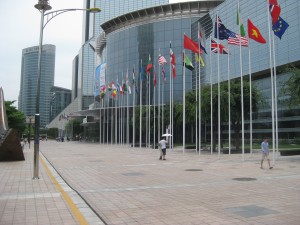
Traveling from Philadelphia to Seoul, I changed planes in San Francisco. Noticing that the person sitting opposite me could easily have been a mathematics educator, I introduced myself, and found that I was sitting next to Alan Schoenfeld, two of whose articles I assign each year for my methods class at Penn. Alan’s a superstar in mathematics education, and is the most recent recipient of the Klein award from ICME (presented just two days after I met him, during the opening ceremony). He’s also a very nice guy.
The conference was to begin on Sunday, July 8, and I made a point of arriving on Saturday in order to ease my adjustment to the time change; Seoul time differs from Philadelphia time by 11 hours. I had been in contact with my up-till-now virtual friend Nate Burchell; we had corresponded but never met in person. Nate used to teach in India, and is now at an international school in Seoul. Nate and his wife Joie very kindly invited me to dinner the evening of my arrival.
So out I headed from the hotel, stopped at an ATM outside a bank, and tried to get some Korean cash (approximately 1100 won to the dollar). But the machine was initially recalcitrant, and when I persisted it seized my card. It may have also tried to tell me what it was doing, but it spoke no English and I could read no Korean, so it clearly had the upper hand in whatever dispute we were engaged in. Worse, it was already 6:30 pm Seoul time on Saturday, so clearly no staff was available in the bank. Next to the ATM was a phone with three buttons, so I pressed a button and tried to communicate with someone on the other end what had happened. I thought the person on the other end said that someone would come to help me, but I was very worried about whether I’d been able to make myself understood.
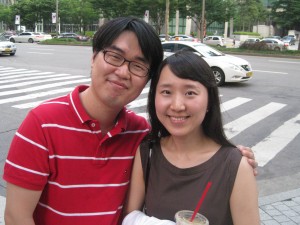
I then stepped outside, stopped a couple on the sidewalk, and asked them to use their phone to let Nate and Joie know that I’d be late. While the young woman helped me place the call, the young man went to the ATM, read the legend on the screen, pressed a button on the phone, and did indeed determine that security personnel would arrive momentarily to help me retrieve my card.
I thanked them profusely and settled down to wait. The next thing I knew the couple returned accompanied by the security guard, helped me explain to the guard what had happened, and stayed until the guard returned with my card.
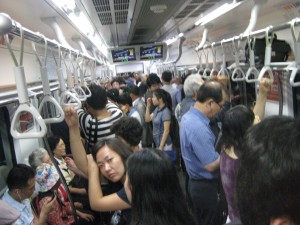
With my credit card returned, I was finally able to purchase a subway ticket and head to Nate and Joie’s for dinner. Once there, I had a wonderful home-cooked meal and a delightful chance to talk and play with their two older children Will (6) and Annie (4). (My oldest grandchildren are 8 and 6, so Will and Annie helped me to deal with my grandchild-withdrawal symptoms.) Nate and I even talked Sketchpad for a few minutes. (Nate also attended ICME, including the discussion group that I organized; I’ll describe that discussion group in a separate post.)
I mention both these things — the incident with the Korean couple and the ATM, and the dinner invitation from Nate and Joie — because they proved to be typical of the friendly, solicitous, welcoming reception we enjoyed in Korea.
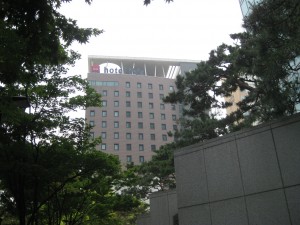
Steve, Nick, Bill, and I were staying at the Hotel Ibis Ambassador, just a ten-minute walk from the convention center. We found several other friends of Key also staying at our hotel, among them Michael deVilliers (Rethinking Proof), Diane Resek (Interactive Mathematics Program, IMP), Gerry Stahl (Math Forum connection), and Arthur Powell (also Math Forum, and a long-time friend of Steve’s family).
Sunday was registration and a welcome reception. I’d arranged a meeting of the organizing team for my discussion group to plan our first session, but we were interrupted when the afternoon meeting of the Executive Committee meeting of ICMI (the governing body for the conference) let out and Roger Howe from Yale, a member the Executive Committee, sat down and joined us at our table. We chatted briefly with each of us noting that the other’s name seemed familiar, until I realized with a start that Roger had been the stroke oar of the 1966 JV eight-oared crew on which I rowed during my sophomore year at Harvard. Roger (a senior that year) graduated, went into mathematics, and developed an interest in math education. I rowed for two more years (including the 1967 Pan American games, the 1967 European Championship, and the 1968 Olympics) and began teaching math less than a month after the Olympics ended. We’d lost touch with each other after the 1966 season, so it was quite a surprise for both of us to renew our connection, more than 46 years later, through a chance meeting in Seoul.
That evening, Diane Resek and I picked a Korean restaurant for dinner, sat down, and opened the menu only to find that it was a high-end barbecue establishment specializing in many dishes based on stomachs and intestines, but with no other choices. I pride myself on being adventurous, but this was beyond my limit, and Diane felt the same way. The waiter immediately recognized our discomfort, hastened to assure us that he was not offended, recommended a more typical Korean restaurant, and walked us a block and a half to make sure we’d be able to find it.
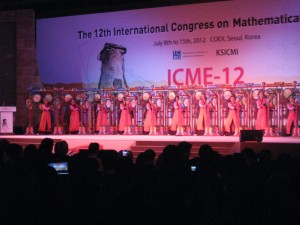
The opening ceremony Monday morning included the Klein Award to Alan Schoenfeld, and finished with a spectacular Korean dance-and-drum performance.
Monday through Wednesday were chock-full of plenaries, lectures, topic study groups, discussion groups, and other chances to connect with all the fascinating people who care about mathematics education, and I’ll talk about some of that in another post.
We got a chance to recover from the intensity on Thursday, the scheduled excursion day. I signed up for a trip that visited the big palace grounds and a park with historic dwellings cultural activities, and even a chance to visit a traditional Korean healer. There’s a sense of history here that we in the US can access only rarely in our country.
The ICME conference itself concluded Sunday with a very different, and even more thrilling, performance of traditional Korean dance and music, and I immediately headed to the bus station to catch a bus to Songnisan National Park. Korean buses are incredibly efficient and comfortable.
In Songnisan park I took a wonderful and challenging hike with both natural wonders (the rock called Munjangdae) and historic treasures like a trail-side monastery.
And as I began my trip home, even in Incheon airport the memories of the food and the music were renewed, leaving them fresh in my mind and leaving me with an urge to return someday to such a friendly and beautiful place.
One theme of the ICME for me was the importance, in mathematics education, of making sure that students have relevant and vivid sensory-motor experiences of the phenomena we want them to understand mathematically. In this context, I found it particularly appropriate to engage in such satisfying sensory-motor experiences in connection with the conference itself. The sounds, the smells, the tastes, the visions, and yes, the steep hills of Korea have accompanied me home and will stay with me.
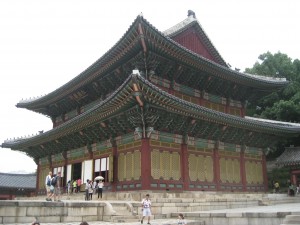
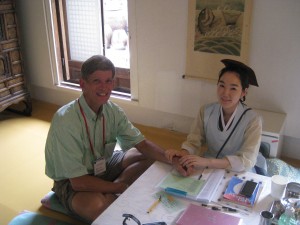
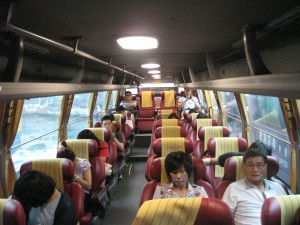
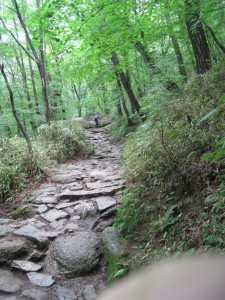
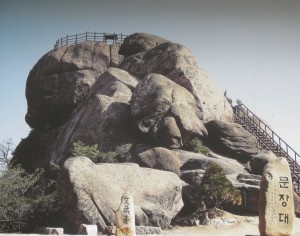
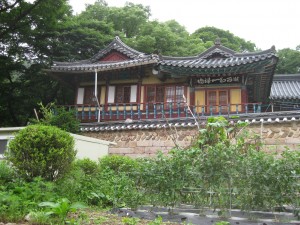
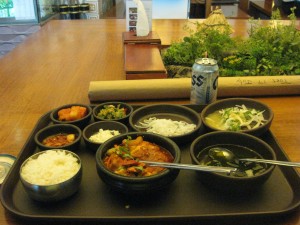
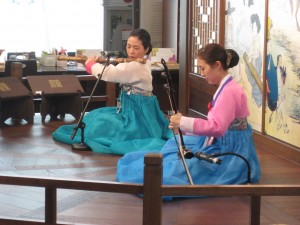
nice, Scott! I lived in Korea, too! 🙂